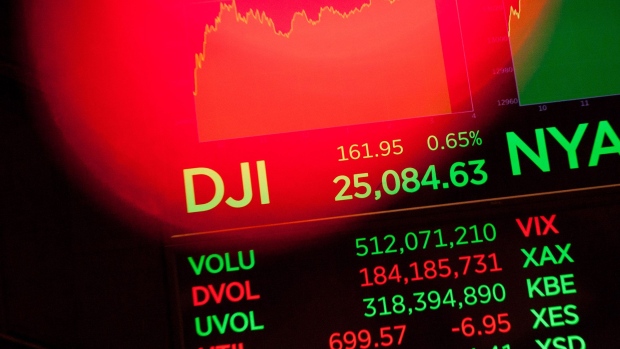May 17, 2024
The Daily Chase: Dow hits 40,000, but should we really care?
, BNN Bloomberg

Here are five things you need to know this morning:
Dow hits 40,000: Breaking news! The Dow Jones Industrial Average has hit the 40,000-point level for the first time ever. While investors are likely to get lots of headlines about the momentous event due to the Dow’s perceived status as a proxy for the stock market as a whole, in reality it’s a bit of an outdated anachronism that we should probably pay less attention to. Unlike other benchmarks such as the S&P500, the Russell 3000 or even the good old TSX Composite Index that contain hundreds of companies or more, the Dow is just a list of 30 relatively well-known companies that most people have probably heard of. Its relatively small number of members make it somewhat misleading, and even how it is calculated is less than ideal. Instead of being based on the total value of the companies included in it, the Dow is drawn up based on the price of individual stocks, leading to some truly head-scratching weightings. Consider three tech giants: Apple, Microsoft and Amazon. They’re all included in the Dow, and they’re worth more than all other components of the Dow put together. But because their individual share prices aren’t stratospheric, they each have less influence on the Dow than UnitedHealth Group or Goldman Sachs do, and even all together only make up a little over 10 per cent of the Dow. Boeing is another great example of what’s wrong with the index. The planemaker’s shares are down about 30 per cent this year and are changing hands at around US$182 apiece on Friday morning. That’s about the same price as Amazon, which has gained 20 per cent over the same time period. Yet the two companies have about the same influence because of the way the Dow is calculated. Full credit to Charles Dow, the stock grouping that bears his name was revolutionary stuff when he concocted it in 1894. But 130 years later, it’s probably long past the time for us to stop giving it so much attention — novelty hats notwithstanding.
Share sales on TSX surging: The Toronto Stock Exchange’s IPO drought continues, but companies already listed on the exchange are raising funds through new shares at a rapid clip. Bloomberg reports that the volume of total financings on the TSX has almost doubled to just shy of $5 billion in the first four months of this year. Buoyed by high prices for gold and copper, it’s no surprise that miners are leading the way, with First Quantum raising more than $1.5 billion in February, followed by $431 million raised by Capstone Copper that same month. The pace of deals is picking up as the year goes on, too, with 58 new ones last month. That’s up from 21 in April of 2023. Daniel Nowlan, National Bank Financial vice chairman and managing director of equity capital markets, told Bloomberg that while it’s good to see the pace picking up, it’s still below historic standards. “It’s still a ways from a normal year,” he said. “We’re not quite there yet.”
Reddit shares jump on OpenAI deal: Shares of Reddit are up about 15 per cent in premarket trading this morning after the social media company struck a deal with OpenAI that will allow chatbot ChatGPT to harvest Reddit content as part of its training, while offering new AI services to Reddit in return. Financial terms have not been disclosed, but it makes sense for both sides considering Reddit’s need to grow its revenues now that it is a public company. “Our data is extremely valuable,” Reddit CEO Steve Huffman said at the Bloomberg Technology Summit earlier this month. “We’re seeing a ton of interest in it.”
Take Two shares slump on GTA VI delay: Shares in video game maker Take Two Interactive are down about three per cent this morning after the company released a gloomy outlook late Thursday, including a delayed release date for its hotly-anticipated next instalment in the money-making Grand Theft Auto franchise. The game isn’t expected to be available until the fall of next year. That’s a big reason why the company now expects bookings of up to US$5.65 billion next year. That’s down from $8 billion initially and $7 billion as recently as February.
Finally, some positive news on wildfires: The situation is still grave with a lot of hot weather ahead of us, but the wildfire situation around the oilsands capital of Fort McMurray, Alberta seems to have gotten incrementally better after firefighters gained control over a smaller blaze threatening the city from the North. The relatively small fire near numerous energy operations was downgraded to “being held” and its size is currently less than a hectare as things stand now, but a much larger blaze from the southwest is currently 20,000 times larger than that one and still a troubling situation. It has already prompted the evacuation of 6,000 residents in the area. Winds blowing from the east and some rain are expected to help things, but the situation is still tense. The remaining blaze is a threat to about five per cent of the world’s daily crude oil output, Rystad Energy said in a report yesterday.